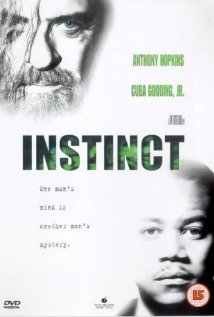
INSTINCT
US, 1999, 126 minutes, Colour.
Anthony Hopkins, Cuba Gooding Jr, Donald Sutherland, Maura Tierney, George Dzundza, John Ashton.
Directed by John Turteltaub.
Perhaps it was the word, instinct, which at the end of the 1990s was, at least in film language, seen in the light of Basic Instinct. While this film does deal with some basic instincts, it is not a sexual exploitation film but rather an exploration of human nature, animal nature, the links between the two and the life of animals.
The film has something of a scientific, ethnological background, with Anthony Hopkins playing a scientist who wants to investigate animals, finds a kinship, is able to live with them, and communicate with them , so much so that when threatened by poachers, he kills the poachers, defending the animals and their lives instead of the lives of the criminal intruders.
The consequence of this is that he is arrested and interned in a Florida prison. He refuses to communicate, especially with his family and his daughter, played by Maura Tierney. The authorities, led by Donald Sutherland, instruct a talented young psychologist, Dr Caulder, Cuba Gooding Jr, to investigate and to interview. Initially, he has little commitment to the case rather than interest and part of his career, but as he continues to interview, to probe, to try to understand, bond grows between the two?
There are some complications with the brutal activities of one of the wardens.
There is not a final dramatic solution to this situation, but rather a continued challenge to the audience as to how they see human nature, human instincts, animal nature and animal instincts and the respective rights of each.
1. The title, the human experience, animal experience, the instinctive drive, natural, consequences?
2. The scientific background, animal evolution, human evolution? Human nature, intellect, will, feelings, the communication? Animal nature, knowledge, will, feelings, communication?
3. The strong cast, performances, credibility? The musical score?
4. In the United States, Florida, prisons? Science, laboratories? Medicine and psychology? The African background, the animals, the poachers, death?
5. Audience response to issues of human nature, animals, instinct?
6. The theories, Ethan Powell and his background, science, investigative experiences? Learning about the animals, communing with them, learning about them, feeling the communication? Living with the animals, silent with them? The defence, the poachers, their crimes, their right to their lives, Powell killing them?
7. The arrest, bringing Powell back to the United States, imprisonment, isolation, not communicating with his family? His manner in the prison, drawing on what he had learnt living with the animals?
8. Dr Caulder, his superiors, his talent, skills, visiting with Powell? His scepticism, personal self-interest? The effect of the interactions with Powell, his talking, Powell not replying? The length of time, the pressure from the superiors? Gradual breakthroughs? Dr Caulder and his learning experience, going beyond his normal horizons? Psychology?
9. Powell and his family, not communicating? His daughter, her concern, discussions with the doctor, the visits, the consequences?
10. The warder, his savage attitudes, behaviour, cruelty? The effect on Powell?
11. The police, the courts, justice, ordinary procedures, the charges against Powell, response, the hearings?
12. The issues of what is normal, human, humane? The conventions? The challenge?